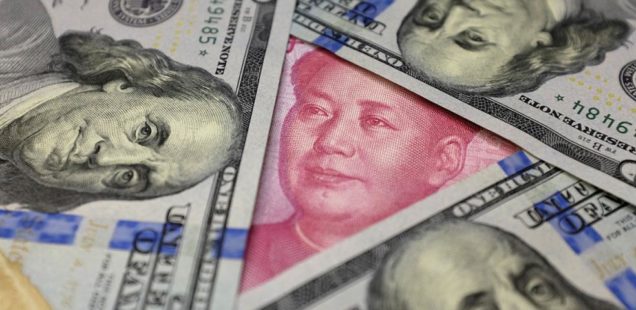
The Pentagon Is Endangering Our Economic Ties With China
When China refused to allow the USS John C. Stennis to dock in Hong Kong 10 days ago, it got only modest mention in the news reports. Keeping the nuclear-powered supercarrier and its strike group out of a port where American ships have docked for decades is a calculated signal of worsening relations between Washington and Beijing—passive aggression in very pure form.
Given that Hong Kong is among the busiest commercial ports in Asia, we’re on notice now. Every American with an interest in our dense, multisided trade and investment relationships with China should start paying close attention to the mounting tensions between Beijing and Washington.
Related: U.S. Defense Secretary Visits Carrier in Disputed South China Sea
The first thing you see is this: America’s economic ties with China have been out of whack with national security policy since Deng Xiaoping’s reforms began opening China in the early 1980s. Business booms, while military and geopolitical competition intensifies.
This isn’t going to do any longer. There is an emerging danger that rivalry for strategic influence in the western Pacific will damage trade and investment relations.
Beijing was characteristically subtle but perfectly clear when asked why it refused the Stennis port privileges. The foreign ministry told the South China Morning Post, Hong Kong’s leading English-language daily, that port calls were approved “on a case by case basis in accordance with sovereignty principles and specific circumstances.” A ministry official in Hong Kong then stated the visit was “not convenient.”
The “specific circumstances” were lost on no one. Two weeks earlier Defense Secretary Ashton Carter stood on the same carrier’s flight deck as it passed through the South China Sea and declared, “The United States intends to continue to play a role out here that it has for seven decades.”
Related: China Is Buying Up US Companies — Does Anyone Care?
A week later the U.S. Pacific Command sent six heavily armed A-10 Thunderbolts on flights near the Scarborough Shoal, which is among the disputed land formations in the South China Sea over which Beijing claims sovereignty.
Allowing or refusing port calls has long featured in Asia’s diplomatic sign language. When ties between Beijing and Tokyo temporarily warmed in 2008, a Japanese destroyer laid over at a Chinese port for the first time since World War II.
Keeping the Stennis out of Hong Kong harbor was a big, worrisome move, laden with symbolism in the Chinese fashion. There are three implications.
One, choosing Hong Kong as the venue to respond to Carter’s assertion of U.S. primacy in the Pacific signals that China views its relations with the U.S. as unitary. While trade and investment are mutually beneficial, economic ties are not immune to fallout from sharpening political and diplomatic friction.
Two, China will go to the wall as it asserts its influence in the western Pacific. Regardless of what may be at stake, no challenge from the U.S. has a prayer of forcing Beijing to accept the 70-year status quo Carter indelicately referenced aboard the Stennis.
Related: Bullet Trains May Finally Come to the US, Thanks to Chinese Investors
Finally, Hong Kong’s status as a special administrative region in the Sino-British treaty that reestablished Chinese sovereignty in 1997 does not make the territory some kind of protected zone. The fact that U.S. warships are common sights along Victoria Harbor only magnifies the sharp edge of Beijing’s gesture.
Good sinologists would understand these things. There’s a lot of history and culture and 175 years of wounded pride in China’s drive to “stand up,” as Mao famously put it. This has to be reckoned with.
But defense secretaries and fleet commanders such as the bluntly spoken Harry B. Harris, trained in operational expertise but rarely diplomacy, do not generally make good sinologists. This is the root reason Washington’s China policies are so discombobulated.
Beijing hasn’t tagged a single iPhone or fashion accessory as an instrument of retaliation as strategic and geopolitical tensions mount. No one’s suggesting this. But there’s less room every day for complacency on this score in the American business and investment communities. Sooner or later, both sides of the relationship are bound to intersect.
Related: China Ban on Apple Services Is a Challenge for Key Growth Area
The State Department once boasted an honorable tradition of diplomats trained in Asian languages, cultures, and histories. Some of these people were scapegoats during the “Who lost China?” arguments after the 1949 revolution, and the Pentagon gradually eclipsed State in the policy-planning space during the Cold War. By the Reagan years the process was more or less complete.
It’s time to revive the tradition. We need big-picture diplomats capable of integrating politics, economics and national security questions—men and women trained to understand China’s perspective even if they entertain no sympathy for it.
Whether we like it or not, China has a place in maintaining security in its neighborhood. The sooner Washington accepts that seven decades of unchallenged primacy are over, the easier it will be to continue exercising a very considerable degree of influence, as others in the region clearly welcome.

